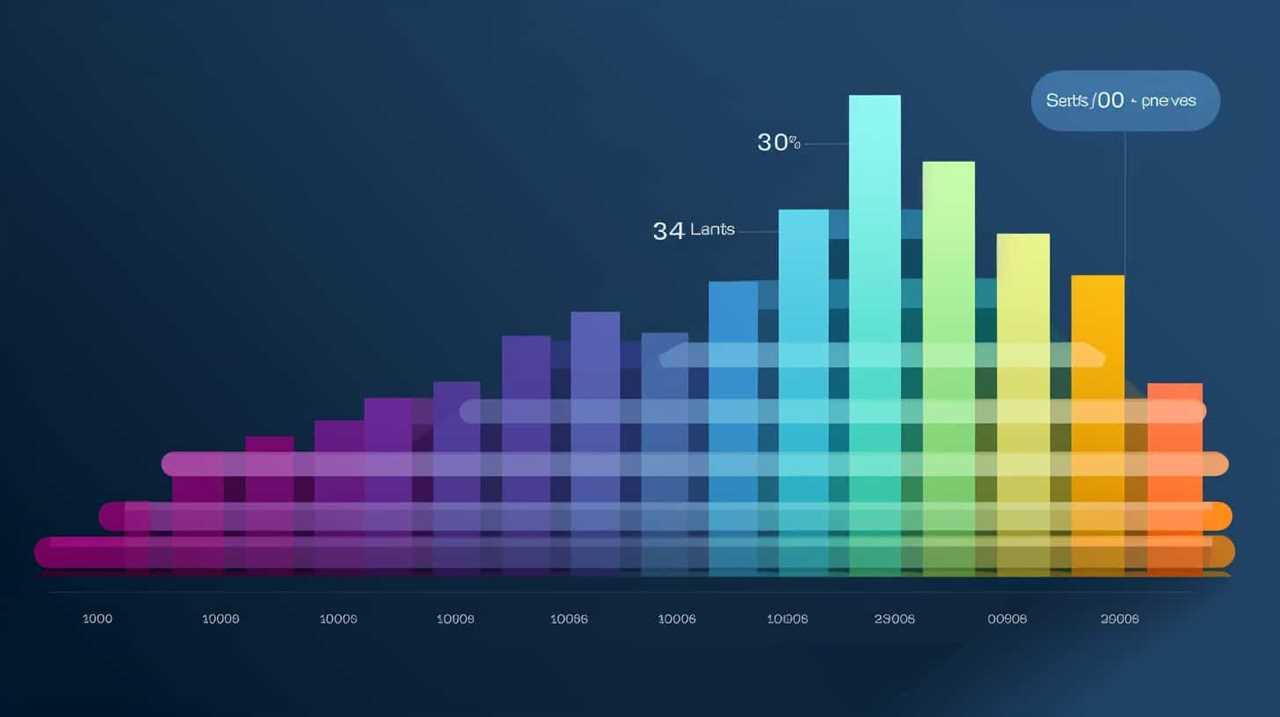We’re committed to delivering a straightforward response to the commonly asked question: precisely, what is the role of an SEO writer?
Well, get ready to be amazed, because we’ve got some mind-blowing stats for you. Did you know that 93% of online experiences start with a search engine?
That’s where SEO writers come in. We’re the ones who craft keyword-focused, engaging content that helps websites rank higher in search results.
But it’s not just about writing – we also optimize on-page elements and build high-quality backlinks.

So buckle up, because we’re about to dive into the exciting world of SEO writing.
Key Takeaways
- SEO writers optimize website content by strategically incorporating relevant keywords throughout the content.
- Keyword research is crucial for identifying the right keywords to optimize content and attract organic traffic.
- Content optimization techniques, such as optimizing meta tags and on-page elements, improve search engine visibility and increase organic traffic.
- Building high-quality backlinks from reputable websites in the same industry is essential for improving search engine rankings.
Understanding the Role of a SEO Writer
We, as SEO writers, play a crucial role in optimizing website content to improve its visibility and ranking on search engine results pages. Understanding content optimization and the importance of keyword placement are key aspects of our role. By strategically incorporating relevant keywords into the content, we can enhance its relevance and increase its chances of appearing in search results when users search for related topics.
Effective keyword placement involves placing keywords in the title, headings, and throughout the body of the content. However, it’s important to strike a balance and avoid keyword stuffing, as search engines now prioritize high-quality, user-friendly content.
In the next section, we’ll delve into the process of conducting keyword research, which is essential for identifying the right keywords to optimize our content.

Conducting Keyword Research
To conduct keyword research, an SEO writer utilizes various tools and techniques to identify the most relevant and high-performing keywords for optimizing website content. This process involves analyzing competitor websites to uncover the keywords they’re targeting and ranking for. By conducting a competitor analysis, an SEO writer can gain valuable insights into the competitive landscape and identify opportunities to target keywords that their competitors may have overlooked.
Another important aspect of keyword research is identifying long tail keywords. These are longer and more specific keyword phrases that typically have lower search volume but higher conversion rates. By incorporating long tail keywords into their content, SEO writers can attract more targeted traffic and improve the chances of converting visitors into customers.
Creating SEO-friendly Content
When it comes to creating SEO-friendly content, keyword research is of utmost importance. By identifying the right keywords, we can optimize our content to rank higher in search engine results and attract more organic traffic.
Additionally, optimizing meta tags, such as title tags and meta descriptions, helps search engines understand the relevance of our content and improves its visibility to users.

Keyword Research Importance
Optimizing content for search engines requires a thorough understanding of the significance of keyword research in creating SEO-friendly content. Keyword research is an essential step in the process of crafting content that ranks well in search engine results and attracts organic traffic.
Here are three key reasons why keyword research is crucial for creating SEO-friendly content:
- Long tail keywords profitability: Long tail keywords are longer and more specific keyword phrases that have lower competition but higher conversion rates. By identifying and targeting these long tail keywords, you can optimize your content for better visibility and attract highly targeted traffic that’s more likely to convert into customers.
- Competitor analysis in keyword research: Analyzing your competitors’ keyword strategies can provide valuable insights into the keywords they’re targeting and the opportunities you can capitalize on. By identifying gaps and weaknesses in your competitors’ keyword strategies, you can optimize your content to rank higher and gain a competitive edge in the search results.
- Improved relevance and user experience: Keyword research helps you understand the language and vocabulary that your target audience uses when searching for information. By incorporating these relevant keywords into your content, you can improve its relevance and make it more valuable and informative for your audience. This, in turn, enhances the overall user experience and increases the likelihood of users staying on your website and engaging with your content.
Optimizing Meta Tags
As SEO writers, we optimize content by enhancing the meta tags, which play a crucial role in creating SEO-friendly content. Meta tags are snippets of code that provide information about a webpage to search engines. By optimizing these tags, we can improve website visibility and increase organic traffic.
When optimizing meta tags, we focus on including relevant keywords that accurately describe the webpage’s content. This helps search engines understand what the page is about and rank it accordingly in search results. We also ensure that the meta tags are concise, compelling, and entice users to click on the webpage.

Optimizing On-page Elements
One of our key responsibilities as SEO writers is to ensure the optimization of on-page elements. Optimizing on-page elements plays a crucial role in maximizing website traffic and improving search rankings. Here are three important elements to focus on:
- Title Tag: The title tag is displayed as the clickable headline in search engine results. It should be concise, descriptive, and contain relevant keywords. A well-optimized title tag not only helps search engines understand the content of the page but also entices users to click through to your website.
- Header Tags: Header tags (H1, H2, H3, etc.) are used to structure the content on a webpage. They provide hierarchy and help search engines understand the main topics of the page. Including keywords in header tags can improve search rankings and make the content more accessible for users.
- URL Structure: A clean and descriptive URL structure helps search engines and users understand what a page is about. It should be concise, include relevant keywords, and use hyphens to separate words. A well-optimized URL structure can improve search rankings and make it easier for users to navigate your website.
Building High-quality Backlinks
To further enhance the visibility and relevance of the website, we continue by focusing on the subtopic of building high-quality backlinks. Building high-quality backlinks is crucial for improving the website’s search engine rankings and driving organic traffic. It involves outreach strategies and link building techniques to acquire links from reputable websites in the same industry or niche. These backlinks act as votes of confidence for the website, signaling to search engines that it is trustworthy and authoritative.
To give you a better understanding, here is a table showcasing three effective outreach strategies and link building techniques:
| Outreach Strategies | Link Building Techniques |
|---|---|
| Guest blogging | Broken link building |
| Influencer outreach | Content promotion |
| Resource page link | Skyscraper technique |
By implementing these strategies and techniques, the website can attract high-quality backlinks and establish its authority in the online space. With a strong backlink profile, the website will be better positioned to rank higher in search engine results pages (SERPs).

In the next section, we will delve into analyzing and monitoring website performance to ensure the effectiveness of our SEO efforts.
Analyzing and Monitoring Website Performance
We use various tools and metrics to analyze and monitor the performance of our website, ensuring that our SEO efforts are effective. By utilizing website analytics, we gain valuable insights into how our site is performing and identify areas for improvement. Tracking SEO performance allows us to measure the success of our optimization strategies and make data-driven decisions to enhance our rankings in search engine results.
Here are three key aspects we focus on when analyzing and monitoring website performance:
- Traffic analysis: We examine the number of visitors coming to our site, their geographical location, and the sources that drive traffic. This information helps us understand which marketing channels are most effective and adjust our strategies accordingly.
- Conversion tracking: We track the actions visitors take on our site, such as making a purchase or filling out a form. This enables us to measure the effectiveness of our website in converting visitors into customers and optimize our conversion funnels.
- Page performance: We analyze the loading speed and user experience of individual pages on our site. By identifying slow-loading pages or usability issues, we can improve the overall user experience and increase engagement.
Through continuous website performance analysis and monitoring, we can ensure that our SEO efforts are driving meaningful results and achieving our goals.

Staying Updated With SEO Trends and Algorithms
Staying ahead of SEO trends and algorithms is crucial for a SEO writer. As digital marketers, we constantly strive to stay updated with the latest developments in the industry to ensure our content remains relevant and effective.
SEO writing techniques are constantly evolving, and it’s essential to stay ahead of the competition by adapting our strategies accordingly. By keeping a close eye on search engine algorithms and trends, we can optimize our content to meet the changing demands of the online landscape.
This involves staying up-to-date with industry news, attending conferences and webinars, and actively engaging with the SEO community. By staying informed and continuously honing our skills, we can effectively navigate the ever-changing world of SEO and deliver high-quality content that ranks well and engages our target audience.
Now, let’s explore how collaborating with other digital marketing professionals can further enhance our SEO efforts.

Collaborating With Other Digital Marketing Professionals
When it comes to collaborating with other digital marketing professionals, effective team collaboration is key.
By working together, we can maximize our marketing strategies and achieve better results.
Effective Team Collaboration
Collaboration with other digital marketing professionals is essential for a SEO writer to effectively optimize content for search engines. As a team, we can achieve better results by pooling our expertise and skills together. Here are three key reasons why effective team collaboration is crucial for SEO writers:
- Effective Communication:
By working closely with other digital marketing professionals, we can ensure that our SEO strategies align with the overall marketing goals. Clear and open communication allows us to understand the target audience, identify keywords, and create content that resonates with both search engines and users. - Problem Solving:
Collaboration brings different perspectives and ideas to the table. When faced with challenges, working together allows us to find innovative solutions. By tapping into the collective knowledge and experience of the team, we can overcome obstacles and optimize our content effectively. - Maximizing Marketing Strategies:
Collaborating with other digital marketing professionals enables us to leverage their expertise in areas such as social media, paid advertising, and analytics. By integrating SEO with other marketing strategies, we can create a holistic approach that maximizes our efforts and drives better results.
Maximizing Marketing Strategies
Working closely with other digital marketing professionals, we maximize our marketing strategies by leveraging their expertise in areas such as social media, paid advertising, and analytics. Collaboration is key in the ever-evolving world of digital marketing, and by working together, we’re able to achieve our common goal of maximizing online visibility and improving search engine rankings.

Social media experts bring their knowledge of platforms such as Facebook, Instagram, and Twitter to the table. They help us create engaging content that resonates with our target audience and drives traffic to our website.
Paid advertising specialists utilize their expertise in platforms like Google Ads and Facebook Ads to create targeted campaigns that reach the right audience at the right time.
Analytics professionals play a critical role in tracking the performance of our marketing efforts. By analyzing data, they provide valuable insights that inform our strategies and help us make data-driven decisions.
Frequently Asked Questions
How Long Does It Take to See Results From SEO Writing Efforts?
In SEO writing, it takes time to see results. The SEO writing timeline varies, depending on factors like competition and keyword difficulty. Success in SEO writing is measured by improved rankings and increased organic traffic.

What Are Some Common Mistakes to Avoid When Writing Seo-Friendly Content?
When writing SEO-friendly content, it’s crucial to avoid common mistakes and pitfalls. By being mindful of keyword usage, avoiding duplicate content, and ensuring proper formatting, we can optimize our writing for maximum impact.
How Can a SEO Writer Effectively Optimize On-Page Elements Without Compromising the User Experience?
To effectively optimize on-page elements without compromising the user experience, we utilize SEO writing techniques that balance keyword density and readability. This ensures our content is engaging, optimized, and appeals to an audience that desires mastery.
What Are Some Effective Strategies for Building High-Quality Backlinks?
When it comes to building high-quality backlinks, guest blogging and influencer outreach are two effective strategies we use. By collaborating with industry experts and contributing valuable content, we can earn authoritative links that boost our website’s credibility and visibility.
How Can a SEO Writer Stay Updated With the Latest SEO Trends and Algorithms?
To stay updated with the latest SEO trends and algorithms, we actively follow Google updates and stay informed about SEO best practices. This helps us ensure our writing is optimized and aligned with the ever-changing search landscape.

Conclusion
In conclusion, as SEO writers, we play a vital role in improving a website’s visibility and driving organic traffic.
By conducting thorough keyword research, creating engaging and SEO-friendly content, optimizing on-page elements, building high-quality backlinks, and monitoring website performance, we ensure that our clients’ websites rank higher in search engine results.
By staying updated with the latest SEO trends and algorithms and collaborating with other digital marketing professionals, we can effectively enhance online presence and achieve long-term success.
So, let’s be your go-to SEO experts and watch your website soar to new heights.










